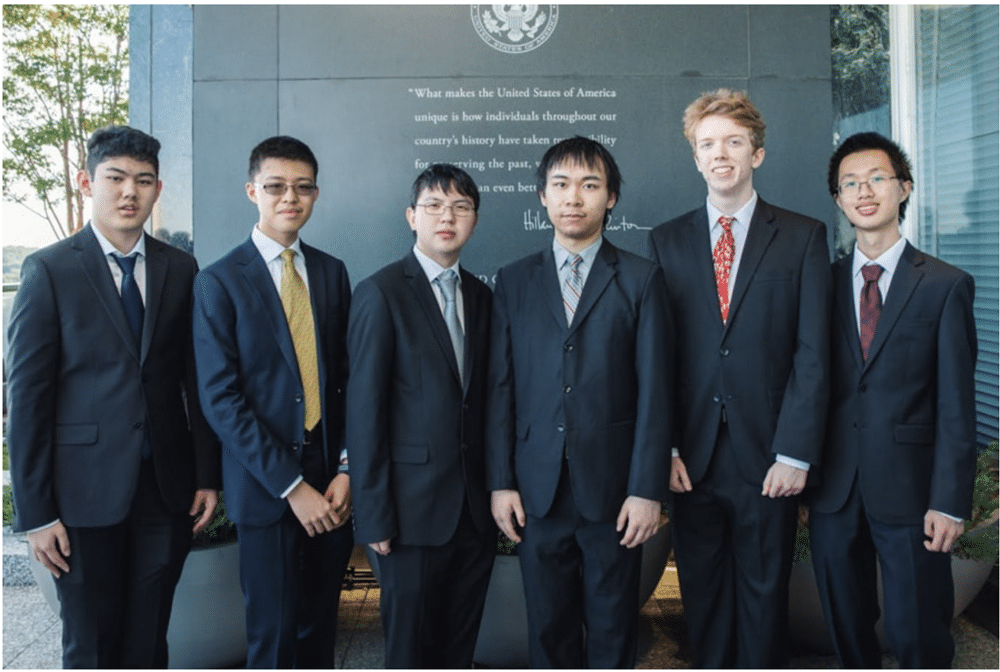
(left-to-right: Edward Wan, Daniel Zhu, Brandon Wang, Colin Shanmo Tang, Luke Robitaille and Vincent Huang. )
On October 4, 2023, the New York Times published an article by journalist Jessica Grose titled, Teachers Can’t Hold Students Accountable. It’s Making the Job Miserable. In her article, Jessica describes the current crisis in American Education. Her article presents evidence of declining student performance in mathematics and language, grade inflation, increasing student absenteeism and the mass exodus of competent teachers from a poorly paid and diminished profession. Included in her article is a link to a video posted by a middle-school teacher in Georgia who shares the reality of his classroom. The video went viral, resonating with a multitude of teachers and parents who recognize the reality of the declining conditions in education.
It was exactly 66 years ago, on October 4, 1957, that the USSR launched Sputnik, a 184-lb satellite of diameter 22 inches that traveled through space at 18,000 miles per hour. It circled the Earth once every hour and 36 minutes, passing over the United States several times a day, and reminding America that the Russians had beaten them into the exploration of space. This wake-up call–a challenge to America’s dominance in technology–stimulated huge infusions of investment in American education that rejuvenated a focus on mathematics, science and technology and eventually led to America’s landing on the moon.
Today, America’s major military threat comes not from the USSR, but from China. The Chinese understand the importance of mathematics, science and technology, and they are producing large numbers of world-class mathematicians. In fact, in July 2023, China secured first place in the International Mathematics Olympiad for the fifth consecutive year. Among the 112 teams participating this year, China was the only team to have all members win gold medals. The photo shows the members of team US who stood first in the IMO in 2019, one of the four times that the US stood first in the past quarter century. (A graph showing national winners of the IMO in the past several decades is accessible in Intelligence: Where we Were, Where we Are & Where we’re Going.) Performance in the IMO is not important to the security of America, but it’s the canary in the mine, warning of a gradual decay in mathematics and science education in America. But why are top mathematicians important to the security of a nation?
Since science and technology rest on a foundation of mathematical competence, the West will require a population with a high level of mathematical literacy if they are to compete in the global economy and defend borders under growing aggression from dictators. The war in Ukraine should be a new wake-up call, reminding us that our civilization remains as tribal in the 21st century as it was in the 20th century–and weakness continues to invite aggression. In The Code Book, Simon Singh observes:
Although cryptography is now having a major impact on civilian activities, it should be noted that military cryptography remains an important subject. It has been said that the First World War was the chemists’ war, because mustard gas and chlorine were employed for the first time, and that the Second World War was the physicists’ war, because the atomic bomb was detonated. Similarly, it has been argued that the Third World War would be the mathematicians’ war because, mathematicians will have control over the next great weapon of war–information. Mathematicians have been responsible for developing the codes that are currently used to protect military information. Not surprisingly, mathematicians are also at the forefront of the battle to break these codes.
While we must always guard against a xenophobic tendency, we must also be vigilant about our national security as escalating international tensions continue to threaten human civilization. Our national security rests on a foundation of a strong education system in which we invest in our young people. We must provide for them highly competent well-paid teachers, and schools that demand a high standard of attendance and performance. The education of today’s children will not only determine the level of our national security, but also the strength of our future economy. The fall of great empires has almost always been preceded by a diminishing of personal discipline and a general lapse into lethargy. As Edward Gibbon opines in his classic tome, The Decline and Fall of the Roman Empire:
The decline of Rome was the natural and inevitable effect of immoderate greatness. Prosperity ripened the principle of decay…The emperors, anxious for their personal safety and the public peace, were reduced to the base expedient of corrupting the discipline which [had] rendered them formidable to their sovereign and to the enemy; the vigour of the military government was relaxed, and finally…the Roman world was overwhelmed by a deluge of Barbarians.
